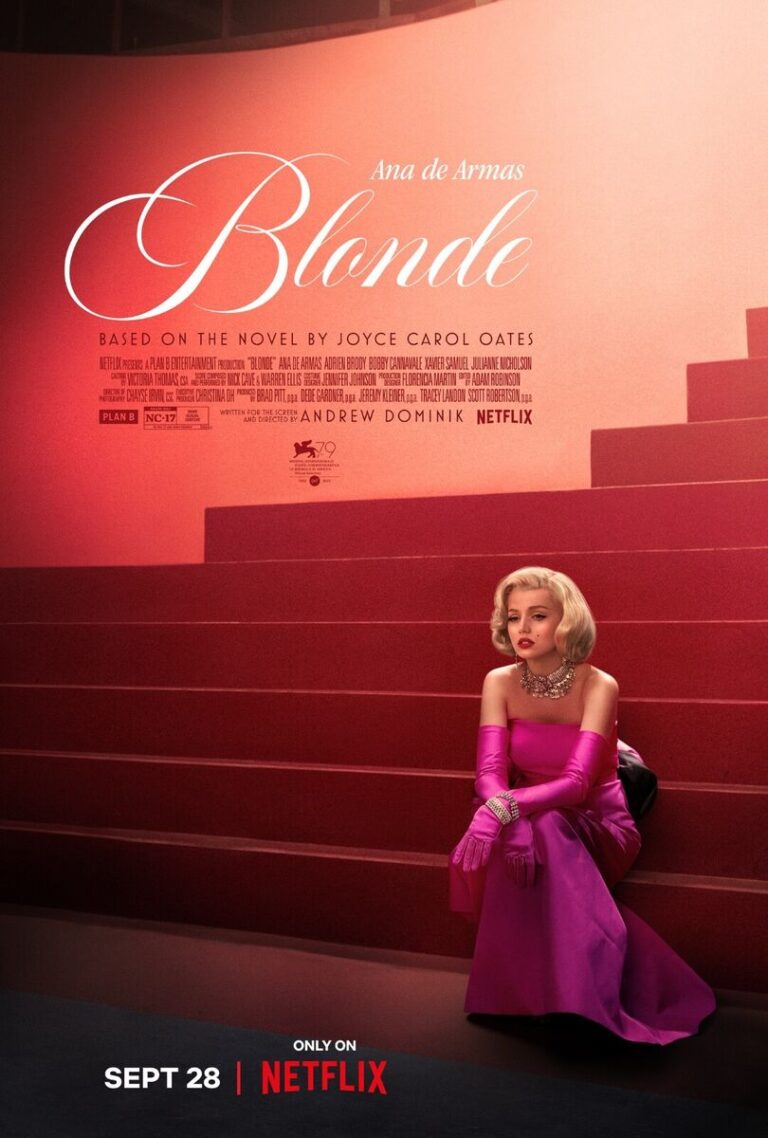Blonde – Snapshot
Blonde is not a biography of Marilyn Monroe, although she is the central character. This is, instead, an unusually forceful exploration of how difficult it is for women to fuse their public and private personas. It is also an indictment of Hollywood, and of men generally. (3.5*)
Where to Watch:
Stream: Netflix
Rent: (Nowhere I could find!)
(Note: This is rated NC-17. No-one should watch this film who is not willing and able to view female nudity, and fairly explicit sex, including one scene of graphic fellatio.)
Blonde – The Oscar Buzz
Oscar Nominations:
Leading Actress (Ana de Armas)
Blonde received a single, well deserved, major nomination for Ana de Armas, as the leading actress. Adrien Brody, who has a supporting role as “The Playwright” (aka Arthur Miller), previously won the Leading Actor Oscar for The Pianist (02). Other Oscar nominees on the crew included Production Designer Florencio Martin also nominated this year for her work on Babylon (22).
Blonde – The Movie’s Family Tree
The Following Movies Share Talent with This One (and if you like these films, you might like this one):
The Assassination of Jesse James by the Coward Robert Ford (07) : Director/Writer(Dominik); Composers (Cave/Ellis)
Hell or High Water (16) : Composers (Cave/Ellis)
BlacKkKlansman (18) : Cinematography (Irvin)
I, Tonya (17) : Costume Design (Johnson); Acting (Nicholson)
Babylon (22) / Licorice Pizza (21) : Production Design (Martin)
No Time to Die (21) / Knives Out (19) / Blade Runner 2049 (17) : Acting (de Armas)
Blonde is the brainchild of New Zealand born Andrew Dominik who is perhaps most famous for his stylized western about Jesse James. He collaborates frequently with one or both of the composers Nick Cave and Warren Ellis who, in this film at least, produce electronic themes that tend on the funereal side. They also composed the music for a movie I liked, Hell or High Water (16). Florencia Martin’s attention to period details is as well done here as it was in the two films cited above.
And finally, there is Ana de Armas. If there is no other reason to watch this movie it is to see this woman act. And, I have to admit, her excellence was a bit surprising. Although always an attractive woman, her acting has, until now, been a bit stilted. Born in 1988, in Havana, Cuba, she moved to Spain in 2007 and starred in Spanish TV and movies. In 2014, she landed in Los Angeles not speaking a word of English. Watching the television series Friends she acquired enough English proficiency to audition for movie roles earning her first major role as Joi in Blade Runner 2049. Her performance in Knives Out was subtle and gained her critical attention. Perhaps her chemistry with Daniel Craig in that film earned her one of the coveted roles as a “Bond Girl” in No Time to Die, where her performance seemed stilted to me. Whatever her experience, she has broken all the barriers with her performance as Marilyn in this film. It is unfortunate that the film’s bad reputation may drag hers down unfairly.
Blonde – What Others Think
And Blonde does have a bad reputation. Both critics and audiences really disliked this film, placing it at the rock-bottom of all 39 Oscar-nominated movies – and I mean, not even close to number 38! Part of the reason for the low ratings is the sheer length of the thing – at nearly three hours, it is a very long time to sit through what, at times, is difficult viewing.
Almost every critic I reviewed found it to be a hard film to watch:
Christy Lemire (RogerEbert): “Blonde is riveting, even mesmerizing, but eventually you’ll want to turn your eyes away as this lurid display becomes just too much.”
James Berardinelli (ReelViews): “Dominik’s focus on the ugliness of the process to the exclusion of all else makes for unpleasant viewing.”
Jonathan Romney (Sight&Sound ): “…This stylistically extravagant, boldly confrontational film instantly knocks you out with the sheer intensity of its cinematic language – then requires you to take a few steps back…”
Manohla Dhargis (New York Times): “If Dominik isn’t interested in or capable of understanding that Monroe was indeed more than a victim of the predations of men, it’s because, in this movie, he himself slipped into that wretched role.”
Austin Collins (Rolling Stone): “Domink’s biopic is a relentless psychoanalysis that wallows in the screen icon’s suffering and ignores her true genius…This is a movie about her suffering.”
Gary M. Kramer (Salon): “Netflix’s insufferable fictionalized chronicle of the starlet’s life is one of the worst tragic icon movies ever.”
Brian Truitt (USA Today): “Netflix’s Marilyn Monroe movie is brutal misery.”
It should be noted that, almost to a person, each of the above critics also raved about Ana de Armas’s performance. So, is the case where a young actress managed to rise above the film’s mediocre, or worse, conceptual foundations? Or is this a case where maybe the critics have, once again, missed something important? (I have more to say about this in the last section.)
Blonde – Special Mention
Marilyn Monroe (some facts) – yes, this film is about her (or maybe, more accurately, it embodies an idea of her as the central character). But Blonde – based on the Joyce Carol Oates novel of the same name (which I admit I have not read) – makes some pretty big leaps and assumptions that are, simply, not based on facts.
Here is a list of things that the movie has either ignored or misinterpreted about Norma Jeanne Baker (aka Marilyn Monroe) based on what I’ve been able to turn up in reliable Internet sources:
While she once believed that Clark Gable might have been her Father, there is no support for the idea that she obsessed about it.
While her mother was diagnosed as schizophrenic, there is no evidence she ever abused Norma Jeanne. In fact, Norma Jeanne lived in twelve foster homes and an orphanage before marrying her first husband (James Dougherty) at age 16 (divorced four years later!). The movie doesn’t even talk about her first marriage.
Although she did have separate affairs with both Charlie Chaplin’s and Edward G. Robinson’s sons, there is no evidence she was involved in a threesome with them.
She had two miscarriages and an ectopic pregnancy that had to be terminated. But there is no evidence she had abortions, much less forced abortions.
There is no evidence she was ever raped – although the casting couch was certainly alive and active in Hollywood’s Golden Era.
There is no evidence that she ever received letters from her “father”.
While it is pretty well assumed that she had some kind of relationship with President John F. Kennedy, there is no evidence he treated her the way he did in this movie.
In short, this movie is – above all – fiction. And we need to make sure we understand what that means, especially in light of how damning the movie’s reception has been.
Blonde – Michael’s Moments
Blonde is about a woman. But it actually isn’t clear which one. The critics, many viewers, and perhaps even the screenplay/director Andrew Dominik and Joyce Carol Oates (who wrote the book on which the movie is based and, apparently, wholeheartedly endorsed the film) think this is about Marilyn Monroe. And, for good reason – her name is invoked multiple times and the story parallels her life, including the explicit references to the films she starred in, her husbands, and pretty accurate simulation of her death. And Ana de Armas, through the magic of movies, looks, talks and acts like Marilyn did. Of course, Blonde is the story of Marilyn Monroe.
But it isn’t! In fact, the damnation of this film is rooted, not in its explicit depiction of sex, but in the disinformation and distortion it portrays about Marilyn’s life. This movie is absolutely not a biopic – a (mostly) accurate depiction of a well-known person’s life. This is pure fiction! Both Oates and Dominik have already admitted that they have both taken great liberties with the facts to present something like an “idea” of Marilyn Monroe’s life – not a true portrayal. Earlier this week I was decidedly angry when I realized this film had badly and, apparently knowingly, disseminated disinformation. It unapologetically creates an incorrect image of a woman’s life that is already badly misunderstood.
I get why the critics, and the viewing public dislike this film. In addition to its difficult length, it portrays Marilyn as a smart woman but one who is constantly victimized by nearly everyone in her life – from her nonexistent father to friends that only take advantage of her, to lovers and husbands who simply assume she will be there for them, to a public that seems to only be concerned about her underwear! She is, in this film, a victim that is savaged over and over again and, frankly, that wears you down after about an hour or so.
Unfortunately, as if Marilyn’s victimization isn’t the only issue, there is also the secondary victimization of Ana de Armas! The critics are absolutely correct when they indict Dominik for his abusive exploitation of his beautiful and young actress. Harvey Weinstein and the casting couch may now be relics of an ugly past, but hasn’t Dominik done the exact same thing with his leading lady? Sure, there are some sex acts that seem to add artistic meaning – I especially liked how, after one of her orgasms the bed sheets fused into the gushing water of Niagara Falls and one of Marilyn’s scenes – that was a great movie transition. But she also performed an explicit act of fellatio, probably on a very good prosthetic phallus and not on a real person – although I’m not sure about that. Was that act necessary in the film? Or was Dominik simply doing, in a bit more modern way, what the moviemakers of Hollywood’s Golden Era did? Was Dominik any less abusive of Ana de Armas than so many other directors were of Marilyn?
But after my second viewing I came to a slightly different interpretation, maybe a little more forgiving of Dominik’s motivations. I have to believe that Oates and Dominik really had a much larger message here. There is a reason why they distorted Marilyn’s life so greatly, and why Dominik abused de Armas so badly. The essence of this story lies not as a biography of Marilyn Monroe (for which it fails badly), but as was stated, this is about the “idea” of Marilyn Monroe – an intellectual abstraction. And the abstraction isn’t just about the actress of that name, but, ultimately, is about “women” – about half of human kind. As in the movie, men have historically forced women into a position where they have to separate their public and private personas. Men have their own way of integrating those two personalities. But women have, at least historically, been discouraged from letting their private life out in any context. Norma Jean and Marilyn Monroe are really two distinct people and the forces that make it impossible for the two of them to link together are what make the dynamics in this film work. This isn’t a film about Marilyn Monroe, it is a statement about how difficult it is to be a woman in a man’s world.
There are problems with this movie, and the critics are right about conveying bad information about Marilyn and for badly abusing Ana de Armas. In the end, though this is a story about half the human race and what the other half has done to them.
Part of me wants to give this movie a dismal rating, but the other part wants to encourage people to watch it – there is a message here and it is artfully done. So I’m settling in at the bottom of my recommended range. (3.5*)


